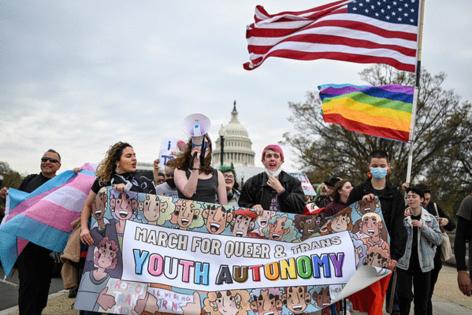Supreme Court leans in favor of state laws that ban hormone treatments for trans teens
Published in Health & Fitness
WASHINGTON — The Supreme Court's conservatives said Wednesday they are inclined to uphold state laws in half the nation that prohibit the use of hormone treatments for transgender teens.
Led by Chief Justice John G. Roberts Jr., they said there is an evolving medical debate over the use of puberty blockers and sex hormones for adolescents who suffer from gender dysphoria.
"My understanding is the Constitution leaves this to the people's representatives rather than the nine of us," Roberts said, adding that none of them are doctors.
Justice Brett M. Kavanaugh agreed.
"There is obviously an evolving debate" about the risks and benefits of these medical treatments, he said. "England is pulling back. That's a yellow light."
He said there were risks and benefits to the use of these hormones, but said the court should not decide which side is correct.
"It just seems to me the Constitution doesn't take sides on how to resolve this," he said.
Justices Clarence Thomas, Samuel A. Alito Jr. and Amy Coney Barrett appeared to agree. Justice Neil M. Gorsuch did not voice a view.
But the court's three liberals argued just as strongly that the conservative state laws discriminate against transgender teens and should be struck down.
"Usually parents get to decide" what is the best medical treatment for their child, said Justice Sonia Sotomayor. "But Tennessee has decided to override them."
In the past three years, Tennessee and 23 other states have adopted laws that forbid prescribing hormones and puberty blockers for those under age 18 for the purpose of gender transition.
In defense of those laws, Tennessee Atty. Gen. Jonathan Skrmetti argued that practice of medicine is a matter for the state, and lawmakers there said the hormone treatments are risky and unproven for adolescents.
The Biden administration urged the court to hear the Tennessee case and to rule the law discriminatory and unconstitutional.
Solicitor Gen. Elizabeth Prelogar and ACLU attorney Chase Strangio urged the court to rule that because the laws discriminate based on sex and gender, they are suspect and should be struck down.
For transgender adolescents, these are "the only treatments that can relieve years of suffering," Prelogar said.
©2024 Los Angeles Times. Visit at latimes.com. Distributed by Tribune Content Agency, LLC.










Comments